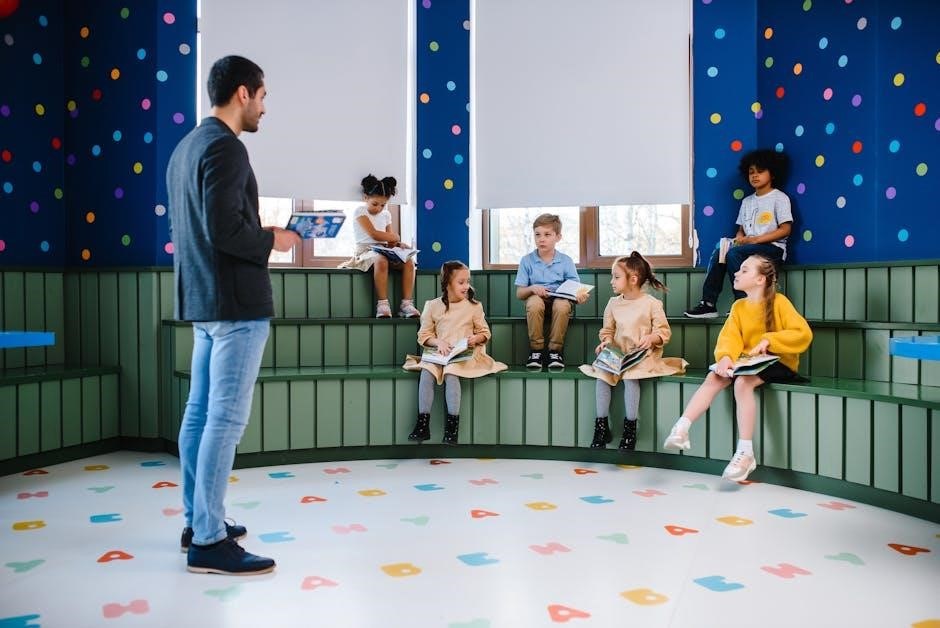Discover the convenience of structured learning with preschool lesson plans in PDF format. These downloadable templates offer organized schedules‚ engaging activities‚ and creative ideas for early childhood education. Perfect for teachers and homeschoolers‚ they provide a flexible framework to foster young learners’ cognitive‚ social‚ and emotional growth effectively.
Overview of Preschool Lesson Plans
Preschool lesson plans are structured guides that outline daily or weekly activities for young learners. They typically include themes‚ learning objectives‚ and engaging tasks tailored to promote cognitive‚ social‚ and emotional development. These plans often feature interactive games‚ crafts‚ storytelling‚ and hands-on experiences to captivate children’s curiosity. Many lesson plans are designed to be flexible‚ accommodating different age groups and learning styles. They also incorporate play-based learning‚ recognizing the importance of fun in early education. Whether focused on math‚ art‚ or science‚ preschool lesson plans aim to create a balanced and enriching learning environment. Teachers can customize these plans to meet specific classroom needs‚ ensuring each child’s unique abilities and interests are addressed. Assessment methods are also included to track progress and adapt instruction effectively.
Importance of Structured Lesson Plans for Preschoolers
Structured lesson plans are essential for preschoolers‚ providing a clear framework for learning and development. They ensure consistency and organization‚ helping teachers deliver engaging and age-appropriate activities. These plans promote skill development across various domains‚ including literacy‚ numeracy‚ and social skills. By setting specific goals‚ structured lesson plans guide children toward achieving foundational knowledge and abilities. They also support teachers in managing classroom time effectively‚ ensuring a balance of play and instruction. Additionally‚ structured plans help identify individual progress‚ allowing for tailored support and enrichment. This organized approach fosters a nurturing environment where children can thrive academically and socially‚ laying a strong foundation for future success. Effective lesson plans are key to maximizing preschoolers’ potential and preparing them for lifelong learning.
Benefits of Using PDF Formats for Lesson Plans
Using PDF formats for preschool lesson plans offers numerous advantages. PDFs are universally compatible‚ ensuring accessibility across all devices and platforms. They maintain consistent formatting‚ preserving the structure and layout of lesson plans. PDFs are also easily downloadable and printable‚ making them convenient for teachers to use in the classroom. Additionally‚ they can be shared effortlessly via email or cloud storage‚ facilitating collaboration among educators. PDF lesson plans often include interactive elements like fillable fields‚ allowing for personalization. Their compact file size ensures quick downloads‚ and they remain unchanged when shared‚ preventing accidental edits. Overall‚ PDFs provide a reliable‚ efficient‚ and visually consistent way to organize and distribute preschool lesson plans‚ enhancing teaching preparation and delivery.

Key Components of a Preschool Lesson Plan
A well-structured preschool lesson plan includes learning objectives‚ materials‚ activity timelines‚ assessment methods‚ and engaging activities. It ensures a balanced approach to cognitive‚ social‚ and emotional development.
Learning Objectives and Goals
Learning objectives and goals form the foundation of an effective preschool lesson plan. They define what children should achieve‚ ensuring activities are purposeful and aligned with developmental milestones. Clear objectives guide teachers in preparing engaging tasks that promote cognitive‚ social‚ and emotional growth. For example‚ a math objective might focus on number recognition‚ while a social goal could emphasize cooperation. These targets help measure progress and ensure a balanced curriculum. By setting specific‚ achievable goals‚ educators create a structured yet flexible learning environment that fosters a love for discovery and prepares children for future academic success. Well-defined objectives also enable parents to understand and support their child’s development;
Materials and Resources Needed
Preschool lesson plans require a variety of materials to ensure engaging and effective learning experiences. Essential resources include age-appropriate toys‚ educational tools‚ and activity-specific supplies. For example‚ art projects may need crayons‚ paints‚ and paper‚ while math activities might require counting blocks or number charts. Storytime often involves picture books‚ puppets‚ or audiovisual aids. Additionally‚ printable worksheets and activity guides from PDF lesson plans provide structured tasks for skill development. Organizing these materials in advance ensures smooth execution of the lesson. Access to digital tools‚ like educational apps or interactive whiteboards‚ can also enhance learning. Having all necessary resources readily available helps create a productive and enjoyable environment for young learners to explore and grow.
Activity Timeline and Schedule
A well-structured activity timeline and schedule are crucial for effective preschool lesson plans. These plans typically outline daily or weekly routines‚ breaking down activities into manageable time blocks. For example‚ a morning schedule might include circle time‚ snack breaks‚ outdoor play‚ and themed activities. PDF lesson plans often provide detailed timelines‚ ensuring a smooth transition between tasks. This structure helps maintain focus and engagement among young learners. Additionally‚ flexible scheduling allows for adjustments based on the class’s pace and interests. Including visual timers or activity charts can also support children in understanding the flow of the day. A clear timeline ensures that all learning objectives are met while fostering a sense of predictability and routine.
Assessment and Evaluation Methods
Effective preschool lesson plans incorporate assessment and evaluation methods to track children’s progress. These may include observations‚ checklists‚ and portfolios to document developmental milestones. PDF lesson plans often provide templates for recording notes on social‚ emotional‚ and cognitive growth. Interactive activities and group participation are also assessed to gauge understanding. Teachers use these tools to identify areas where children may need additional support. Assessments are shared with parents to ensure a collaborative approach to learning. By integrating evaluation into daily routines‚ educators can refine their teaching strategies and ensure alignment with learning objectives. These methods help create a comprehensive understanding of each child’s development‚ fostering a supportive and inclusive learning environment. Regular assessments guide future lesson planning and enrichment activities.

Popular Types of Preschool Lesson Plans
Thematic‚ alphabet‚ math‚ science‚ and art-based lesson plans are widely used‚ offering engaging and structured activities tailored to young learners’ developmental needs and interests.
Thematic Lesson Plans
Thematic lesson plans are a popular choice for preschool educators‚ offering a cohesive and engaging approach to learning. These plans revolve around a central theme‚ such as colors‚ animals‚ or seasons‚ allowing children to explore related concepts across multiple subjects. Activities are carefully designed to align with learning objectives‚ fostering curiosity and creativity. For example‚ a “Farm Animals” theme might include storytelling‚ art projects‚ and sensory play‚ all tied to developmental goals. Many free PDF templates and resources are available online‚ providing structured yet flexible frameworks for teachers. Thematic plans also encourage cross-curricular connections‚ making learning fun and meaningful for young students. They are adaptable to different age groups and learning styles‚ ensuring inclusivity and engagement in the classroom.
Alphabet and Phonics Lesson Plans
Alphabet and phonics lesson plans are essential for introducing young learners to the foundations of reading and language. These plans typically include activities such as letter tracing‚ sound recognition‚ and word building‚ designed to make learning engaging and interactive. Many free PDF templates are available online‚ offering structured yet adaptable frameworks for teaching the alphabet. Activities often incorporate games‚ songs‚ and hands-on exercises to cater to different learning styles. These lesson plans are tailored to help preschoolers recognize and memorize letters‚ understand phonetic sounds‚ and develop early reading skills. They also include printable worksheets‚ flashcards‚ and rhymes to reinforce learning. By using these resources‚ educators can create a fun and effective pathway for children to master the basics of literacy. These plans are a valuable tool for fostering a strong foundation in reading and vocabulary development.
Math and Number Recognition Lesson Plans
Math and number recognition lesson plans are designed to introduce preschoolers to basic numerical concepts through playful and engaging activities. These plans often include counting exercises‚ shape recognition‚ and simple arithmetic games. Activities like sorting objects‚ matching numbers‚ and using manipulatives help children develop foundational math skills. Many free PDF templates offer structured yet adaptable frameworks for teaching numbers and basic math. These plans also incorporate real-world applications‚ such as counting fruits or vegetables‚ to make learning relatable. Interactive worksheets‚ number tracing exercises‚ and group activities are common features. By focusing on hands-on learning‚ these lesson plans help preschoolers build problem-solving skills and a strong understanding of numbers and math concepts from an early age.
Science and Nature-Based Lesson Plans
Science and nature-based lesson plans for preschoolers foster curiosity and exploration through hands-on activities. These plans often include themes like gardening‚ seasons‚ and animal habitats‚ encouraging children to interact with their environment. Activities such as planting seeds‚ observing insects‚ and creating nature-themed crafts help develop scientific inquiry skills. Many PDF templates offer structured yet flexible frameworks for teaching science concepts in an engaging way. These plans also incorporate sensory experiences‚ such as sorting natural materials or conducting simple experiments‚ to make learning interactive. By connecting classroom activities to the outdoors‚ these lesson plans help preschoolers build a foundation for understanding the natural world while promoting creativity and critical thinking skills at an early age.
Art and Craft Lesson Plans
Art and craft lesson plans are essential for fostering creativity and fine motor skills in preschoolers. These plans typically include activities like painting‚ drawing‚ collage-making‚ and crafting with various materials. Many PDF templates offer step-by-step guides for projects aligned with themes or learning objectives. For example‚ seasonal crafts or projects tied to alphabet letters can reinforce other areas of learning. These plans also encourage self-expression and imagination‚ allowing children to explore different textures‚ colors‚ and techniques. With easy-to-follow instructions and material lists‚ teachers can prepare engaging art sessions that cater to diverse skill levels. Art and craft activities not only develop creativity but also build confidence and patience in young learners‚ making them a valuable part of preschool education.

Where to Find Free Preschool Lesson Plan Templates
Find free preschool lesson plan templates on educational websites‚ teacher blogs‚ and platforms offering downloadable PDFs. Many sites provide editable templates for customization and ease of use.
Websites Offering Free PDF Downloads
Several websites provide free preschool lesson plan templates in PDF format‚ making it easy for educators to access and print them. Popular platforms like LessonPlans.com‚ Education.com‚ and Teachers Pay Teachers offer a wide variety of downloadable templates. These websites cater to different teaching styles and include daily‚ thematic‚ and subject-specific plans. Many templates are customizable‚ allowing teachers to adapt activities to their classroom needs. Additionally‚ some sites offer bonus resources like activity calendars‚ printable worksheets‚ and professional development tools. These PDF downloads are ideal for organizing lessons‚ saving time‚ and ensuring engaging learning experiences for young students. They are easily accessible and often free of charge‚ making them a valuable resource for preschool educators.
Editable Lesson Plan Templates
Editable preschool lesson plan templates offer flexibility for teachers to customize activities according to their classroom needs. Available on platforms like Teachers Pay Teachers and Education.com‚ these templates allow educators to personalize learning objectives‚ timelines‚ and materials. Many are designed in Word or Google Docs format‚ enabling easy modifications. Teachers can tailor activities to suit different age groups or learning styles‚ ensuring engaging and developmentally appropriate experiences. These templates often include placeholders for adding specific themes‚ assessments‚ and extensions. By providing a structured yet adaptable framework‚ editable lesson plans save time and help educators deliver effective‚ organized instruction. They are a valuable tool for creating dynamic and impactful preschool curricula.
Subscription-Based Resources
Subscription-based platforms like Education.com and Teachers Pay Teachers provide premium access to a wide range of preschool lesson plans in PDF format. These resources often include customizable templates‚ thematic units‚ and detailed activity guides tailored for various age groups. Subscribers benefit from exclusive content‚ such as interactive worksheets‚ assessment tools‚ and educational games. Many platforms update their libraries regularly‚ ensuring fresh and relevant materials. While free templates are available‚ subscription services offer enhanced convenience and quality‚ making them a popular choice for busy educators seeking comprehensive and organized lesson planning solutions. These resources are ideal for teachers aiming to deliver engaging and structured learning experiences.

How to Create Effective Preschool Lesson Plans
Design engaging lesson plans with structured schedules‚ interactive activities‚ and hands-on learning. Incorporate visual aids and flexibility to adapt to diverse learning paces and developmental stages effectively.
Aligning Activities with Learning Goals
Aligning activities with learning goals ensures a purposeful and focused approach to preschool education. Begin by defining clear‚ age-appropriate objectives that address cognitive‚ social‚ and emotional development. Match activities to these goals‚ ensuring they are engaging and relevant. For example‚ alphabet recognition can be taught through storytelling and crafts‚ while number sense can be developed using counting games. Use thematic lesson plans to integrate multiple skills‚ such as combining art and math in a shape-sorting activity. Regularly assess progress to refine activities and maintain alignment with learning targets. This intentional planning fosters meaningful learning experiences‚ helping children achieve foundational skills and build a strong educational base. Consistency and clarity in goal alignment are key to effective preschool instruction.
Incorporating Play-Based Learning
Incorporating play-based learning into preschool lesson plans enhances children’s natural curiosity and creativity. Play serves as a powerful tool for skill development‚ allowing kids to explore‚ experiment‚ and learn at their own pace. Activities like role-playing‚ puzzles‚ and art projects encourage problem-solving‚ critical thinking‚ and collaboration. Thematic lesson plans often integrate play seamlessly‚ such as using pretend stores to teach math or outdoor games to promote physical fitness. By embedding learning objectives within playful experiences‚ educators create engaging and meaningful opportunities for growth. Play-based learning fosters a love for exploration and discovery‚ making it an essential component of effective preschool instruction. It also helps children develop social skills‚ emotional resilience‚ and a strong foundation for future academic success. Adapting play to suit different learning styles ensures inclusivity and fun for all learners.
Adapting Plans for Different Age Groups
Preschool lesson plans must be tailored to meet the unique needs of different age groups‚ ensuring activities are developmentally appropriate. For infants‚ plans focus on sensory exploration and motor skills‚ while toddlers benefit from play-based learning with simple‚ repetitive tasks. Preschoolers (3-4 years) engage in more structured activities that introduce basic concepts like colors‚ shapes‚ and numbers. Pre-kindergarten plans (4-5 years) build on these skills‚ preparing children for formal education. By adapting lesson plans to each age group‚ educators can foster individual growth and curiosity. Flexible PDF templates allow teachers to customize activities‚ ensuring each child is challenged and supported according to their developmental stage. This approach promotes a nurturing and inclusive learning environment for all ages.

Tips for Implementing Preschool Lesson Plans
Stay organized by preparing materials in advance and using interactive activities to keep children engaged. Be flexible and ready to adapt plans based on class needs.
Organizing Materials and Supplies
Effective organization of materials and supplies is crucial for smooth lesson execution. Use labeled storage bins and shelves to categorize toys‚ art supplies‚ and educational tools.
Place frequently used items within easy reach to save time during activities. Create a checklist to ensure all necessary materials are prepared in advance;
For themed lessons‚ organize supplies into designated kits or baskets to streamline setup. Digital tools like PDF templates can help track inventory and plan supply needs efficiently.
A well-organized classroom environment not only enhances productivity but also encourages a calm and focused learning atmosphere for young students.
Engaging Children with Interactive Activities
Interactive activities are essential for capturing young learners’ attention and fostering their development. Incorporate hands-on tasks like art projects‚ science experiments‚ and role-playing to encourage participation.
Use music‚ movement‚ and storytelling to create dynamic learning experiences. Group games and collaborative puzzles promote teamwork and problem-solving skills.
Integrate sensory play‚ such as finger painting or sorting objects‚ to stimulate creativity and fine motor skills. Digital tools‚ like interactive PDFs‚ can also offer engaging content.
By incorporating these activities‚ preschool lesson plans become more enjoyable and effective‚ ensuring children stay motivated and curious throughout the day.
- Art projects to express creativity
- Science experiments for hands-on learning
- Music and movement activities
- Group games and puzzles
- Sensory play for exploration
Flexibility in Lesson Plan Execution
Flexibility is crucial when executing preschool lesson plans‚ as it allows teachers to adapt activities based on children’s responses and needs.
Be prepared to adjust timelines‚ modify tasks‚ or introduce new ideas to keep the learning process engaging.
Editable PDF templates enable easy customization‚ ensuring plans remain relevant and effective.
Encourage spontaneous discussions or hands-on explorations if they align with learning goals.
Remaining adaptable helps create a dynamic and responsive learning environment‚ fostering children’s natural curiosity and enthusiasm.
- Adjust activities based on student engagement
- Modify timelines to accommodate learning pace
- Use editable templates for customization
- Encourage spontaneous learning moments

Additional Resources for Preschool Teachers
Enhance your teaching with free printable worksheets‚ theme-based curriculum guides‚ and professional development tools. These resources support creative lesson planning and provide engaging activities for young learners.
- Free printable worksheets for math and English
- Theme-based curriculum guides for structured planning
- Professional development tools for educators
Free Printable Worksheets and Activities
Engage your preschoolers with a variety of free printable worksheets and activities designed to promote learning and creativity. These resources cover essential skills like alphabet recognition‚ number tracing‚ and fine motor development. Themes such as colors‚ shapes‚ and nature are incorporated to make learning fun. Many websites offer downloadable PDFs that can be easily printed and used in the classroom or at home. These activities are perfect for reinforcing lesson plans and provide a hands-on approach to education. With a wide range of topics available‚ teachers and parents can find the perfect materials to suit their teaching needs and keep young minds actively learning.
Theme-Based Curriculum Guides
Theme-based curriculum guides provide a structured approach to preschool education‚ organizing activities and lessons around engaging topics. These guides often cover themes like seasons‚ animals‚ or community helpers‚ offering a cohesive learning experience. They include activity suggestions‚ learning objectives‚ and practical tips for implementation. Many guides are available in downloadable PDF formats‚ making them easily accessible. Teachers can customize these resources to fit their classroom needs‚ ensuring a balanced approach to learning. By focusing on specific themes‚ these guides help preschoolers connect new skills and knowledge‚ fostering a deeper understanding of the world around them while keeping lessons fun and interactive.
Professional Development Tools
Professional development tools are essential resources for preschool teachers aiming to enhance their teaching skills and create effective lesson plans. These tools often include workshops‚ webinars‚ and downloadable guides that focus on early childhood education strategies. Many websites offer free PDF resources‚ such as training manuals and curriculum-aligned templates‚ to help teachers design engaging and developmentally appropriate activities. These tools also provide tips on classroom management‚ play-based learning‚ and incorporating diverse learning styles. By utilizing these resources‚ educators can refine their approach to teaching‚ ensuring they meet the needs of their students while staying updated on best practices in preschool education. Such tools are invaluable for both new and experienced teachers seeking to improve their instructional methods and classroom effectiveness;




